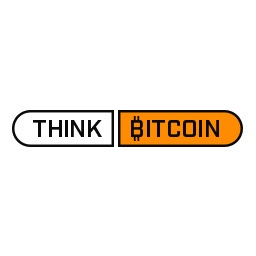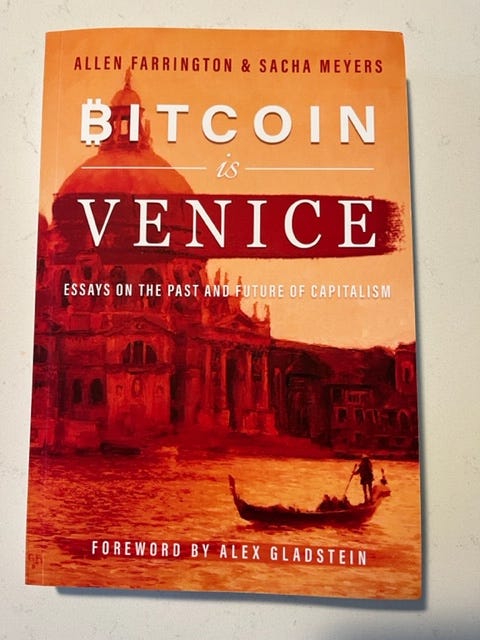Think Bitcoin™ Issue #30
Teasing future essays; combatting energy FUD; how Bitcoin can save the planet; Bitcoin is Venice
Hey friends, welcome back to Think Bitcoin™ for issue #30 and happy Easter to those who celebrate. As always, if you have any questions or comments, feel free to reach out. You can also find me on Twitter (@TheWhyOfFI).
In this issue:
Housekeeping/Announcements: Teasing future pieces and making schedule changes
Content Round-Up: 2 videos and an educational platform
What I’m Reading: Bitcoin is Venice, by Allen Farrington and Sacha Meyers
As always, if you find this newsletter interesting or useful, please share it with others who might find it interesting or useful, too!
Housekeeping/Announcements
This week I want to make a few announcements about the direction I want to take this newsletter. Those who have been subscribers since the early days (if this is you, I very much appreciate the love), know this project originated as my attempt to contribute to the space by providing a mostly educational platform, with commentary on Bitcoin-related current events thrown in.
Over time, as my own opinions and mental models around Bitcoin have continued to develop, I’ve focused more and more of my time and effort on writing thought-provoking essays and longer, more involved pieces about different aspects of Bitcoin.
Going forward, I want to focus my energy entirely on this type of content, as I think it tends to generate the richest, most productive conversations, and I have several such pieces in the works as we speak.
To do this the way I want to do it, however, I’ve realized I need to allow myself a little more time between issues to fully flesh out my ideas, thoroughly explore the different avenues they lead me down, and articulate them in ways that are compelling and cogent.
To that end, I’m going to start publishing every two weeks, as opposed to every week. This will allow me that extra time to sharpen the ideas I want to present and give them a more robust grounding and context.
As most of you know, my wife gave birth to our first child a month ago. The reality of parenthood, coupled with my full-time day job as a lawyer, occupies quite a bit of my waking cogitation. Moving to a biweekly schedule with Think Bitcoin also helps me properly balance these priorities in my personal life.
I’m deeply grateful to you all for continuing to tune in and bear with me as I transition to this new schedule and forge ahead on new work.
Like I said, I have multiple pieces in progress right now, among them an autobiographical multi-part piece about my journey from a committed Bernie Sanders supporter to an even more committed Bitcoiner, the process and causes of this transformation, as well as the lessons that can be drawn from it. I’m also working on a piece about Bitcoin as a field of of study and what a course syllabus for “Bitcoin theory” might look like. Lastly, I want to examine what I view as an inevitable Bitcoin revolution in the context of a couple other historical revolutions, what sets Bitcoin apart, and what doomed others to failure.
On top of these, I’m also continuing to think constantly about how Bitcoin can push our conception of capitalism in more productive directions and how fiat currency inevitably rots and degrades everything it touches.
So stay tuned!
Content Round-Up
1. “An Unexpected Superhero,” a video by Daniel Batten about how bitcoin mining lowers the economic barriers to faster adoption of renewable energy. Most advocates of renewable energy do not fully appreciate, or else have greatly underestimated, the economic challenges to making renewable energy profitable, which is, in turn, holding back its adoption. And its adoption is not growing nearly fast enough to meaningfully combat climate change. In this short, 8-minute video, Daniel Batten explains how bitcoin mining solves renewable energy’s economic problems by providing a location-agnostic, time-agnostic, insatiable customer.
Bitcoin has been constantly maligned in the media and by politicians for its energy usage. But bitcoin mining can effectively solve the economic barriers to wide adoption of renewables, which begets a host of other downstream benefits. A growing number of climate activists are coming to this vitally important realization.
If this is something you’re interested in, I highly recommend following Margot Paez.
2. ElectricMoney.org. This site, the work of Paul Knight, is a one-stop shop for explaining how Bitcoin helps us create a more equitable, more sustainable world. It’s full of helpful resources.
3. “Debate: Crypto vs The Environment, with Lyn Alden and Alex De Vries.” You can see I’m hammering on a theme here because I think it’s important to beat back a lot of the energy-related misinformation about Bitcoin. More broadly, although I think work highlighting Bitcoin’s number-go-up technology is helpful, it’s increasingly crucial to meet the popular narratives of opposition, which grow louder and more underhanded as things progress, with rigorous, fact-based, deeply researched counterarguments. Alex De Vries is behind some of the most ubiquitous environmental criticism of Bitcoin out there, despite the fact that his arguments betray a frustrating ignorance of how Bitcoin works and rest on factual errors. His work has been debunked formally in multiple academic papers. Nevertheless, his talking points have permeated and, at times, underpinned the anti-Bitcoin discourse. It’s essential that we forcefully fight this misinformation at every turn.
An important concept that Alden covers here is that of rival energy vs. non-rival energy. Folks like De Vries talk about Bitcoin as if it was rival energy when, in fact, it is non-rival energy. The latter can be used in ways that are highly beneficial to the electricity grid and to increasing adoption of renewables.
What I’m Reading
I just got this book a few days ago and am immensely enjoying it already. I’m particularly moved by Farrington’s dismantling of the Efficient Market Hypothesis. As someone whose work intersects with both the personal finance and traditional finance communities, I’m accustomed to this hypothesis being accepted as an axiomatic law of the universe on par with, say, gravity.
I found this quoted excerpt from Tarek El Diwany about the intractability of the modern economic consensus and all its “complacent assumptions” pretty incisive:
Orthodox views have often proved all-pervasive and wrong. Even in the light of facts that state otherwise, established assumptions have an uncanny knack of surviving. It is my contention that such is the case in the field of Western economic debate today. Where once the student asked “does raising the interest rate reduce inflation?” he now asks “by how much must we raise the interest rate in order to reduce inflation?” These are the complacent assumptions of the new “consensus economics.”
Many developing nations now reach for the medicines that consensus recommends. But treatments involving “shock therapy” and IMF austerity packages are uncomfortably reminiscent of the remedies of the quacks: extreme in their side effects and of ambiguous benefit. Sometimes, there appears the assertion that things would be worse under any other economic regime. Of course, the assertion is untenable because one can never re-live the past to know the difference. Meanwhile, consensus economics extends its grasp, and society is increasingly coming to accept pollution, the business cycle, inflation, and gross inequalities in wealth as the unavoidable facts of economic life.
I look forward to reading further and sharing my thoughts. In the meantime, I highly recommend checking it out.
As always, thanks for reading! If you enjoyed it or found it useful, share this newsletter widely and freely!
“Civilization is in a race between education and catastrophe. Let us learn the truth and spread it as far and wide as our circumstances allow. For the truth is the greatest weapon we have.” -H.G. Wells
See you next week,
Logan
SUPPORT
Send bitcoin to my Strike
SOCIAL
DISCLAIMER: I am not investment advisor and this is not investment advice. This is not, nor is it intended to be, a recommendation to buy or sell any security or digital asset. Nothing in this newsletter should be interpreted as a solicitation, a recommendation, or advice to buy or sell any security or digital asset. Nothing in this newsletter should be considered legal advice of any kind. This newsletter exists for educational and informational purposes only. Do your own research before making any investment decisions.
© Copyright Logan Bolinger




